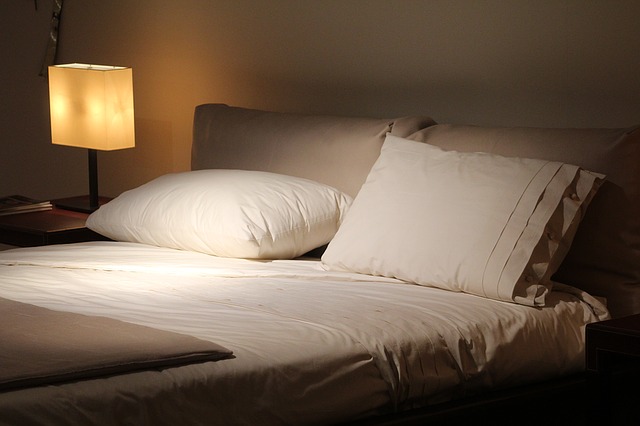Hello darlings,
sleep (for those without children!) can be an elusive beast sometimes, especially when life is a bit hectic and you’ve got a lot on your mind. Just laying in bed, watching the hours tick past and panicking about how tired you’ll feel the next day is not the most productive way to improve your quality of sleep. It can take a concerted effort, and a little bit of trial and error, to get your sleep routine nailed. But once you’ve got it, sleepless nights will become a thing of the past. Follow this handy guide and see if you find yourself slipping into slumber more quickly.
Routine
We impose a bedtime routine on our children but pretend that as we grow older our own routine isn’t as important. Spoiler alert - it totally is! We follow a cycle known as our circadian rhythm, which is also linked to the sunrise and sunset times and acts as a pacemakers for our sleep, our hunger, and even our core body temperature.. Our body wants to follow a daily pattern, but we confuse it by using artificial lights and bright electronic screens. I’m not saying we should go full-on “call of the wild,” waking and sleeping with the sun, but it does cause a lot less stress to our bodies if we follow a daily routine.
If we try to get up and go to bed at around the same time each day, our bodies can start to anticipate our actions and prepare. This means, if we always go to sleep at 11 pm, our bodies know when to start winding down to achieve that, and if we always wake up at seven we don’t feel quite so sluggish. We can help this along by following a bedtime routine that is conducive to relaxation and good quality sleep. For example, a bath with relaxing essential oils such as lavender and chamomile, followed by teeth cleaning and getting into bed has a much better chance of encouraging sleep than watching television until midnight and then jumping right into bed.
It’s best to try to avoid using any bright lights after nightfall as our brains get confused and think that it’s daytime, which just isn’t great when we’re trying to get to sleep. Keep smartphone use to an absolute minimum for the last hour before you plan to sleep, as the amount of information and light our brains are required to process keeps them whirring away long after they should be going into sleep mode.
Environment
It’s easy to excuse a poor sleeping environment with the excuse that it’s dark when we’re asleep, so why would it matter what state our bedrooms are in, but that couldn’t be further from the truth. A bedroom, its furniture, and even its state of tidiness can massively impact our ability to wind down, relax, and get a good quality night’s sleep.
Firstly, the lighting in a bedroom is crucial for good sleep. Blackout blinds are an absolute must for anyone who lives in a town or city, as car headlights and street lighting can disturb our sleep throughout the night. Remember, our eyes don’t just stop working as soon as they’re closed - light can still penetrate our eyelids, so we are still receiving information all night. It’s also an excellent idea to install a dimmer switch on main lights so that we can avoid using them on full power after nightfall, and dim bedside lamps are also a great addition to the room.
The bedroom itself needs to be tidy, organized, clean, and smell fresh. A jumbled room does not contribute to serenity as we’re trying to unwind, and any strong scents can be distracting to us as we sleep.
Our bedroom furniture also has a significant impact. A good quality mattress, duvet, and pillows are essential to our comfort and therefore our quality of sleep. If a mattress is too hard or soft, or just poor quality, we find our sleep is more regularly interrupted as we have to wake up to rearrange ourselves, and it can even cause long term physiological issues. It helps to find a mattress that is particularly suited to our personal needs, as we all require different levels of support and comfort. Head online to see what you can learn from Mattress-Guides.net.
Wellbeing
Our health has a significant impact on the quality of sleep we get, as well as our happiness and stress levels. Our diets are an especially important factor. A good healthy diet enables our bodies to wind up and wind down more efficiently. If we are pumping our bodies full of processed foods and sugars, our energy fluctuations can be so high and erratic that they can make it difficult to unwind or even sleep altogether. It’s particularly important not to eat anything for the last two or three hours before sleep so that anything is mostly digested and our metabolisms have had an opportunity to stabilize. Hydration is also important - around eight cups of water a day is optimal. If we are not hydrated, our metabolism is less effective, and our sleep will be restless and poor quality.
Daily exercise is a great booster for good quality sleep. Even half an hour of moderate exercise a day can ensure our bodies are suitably tired enough for sleep by the time bedtime rolls around. A workout that can be done in your own home with the help of the best weigh bench, is an excellent stress buster too. It causes the release of endorphins and improves circulation, all of which aid feelings of wellbeing and happiness. Since stress and anxiety are the leading causes of insomnia, any little bit of exercise helps.
The main things to remember for a great night’s sleep is to follow a good routine, observe a healthy lifestyle, and ensure that your sleeping environment is relaxing and comfortable, your body can do the rest. Hopefully, you’ll find that if you follow these pointers, your quality of sleep will improve naturally, and you’ll feel more rested and alert in the daytime, without the need for prescription medication.
Lot's of love

















